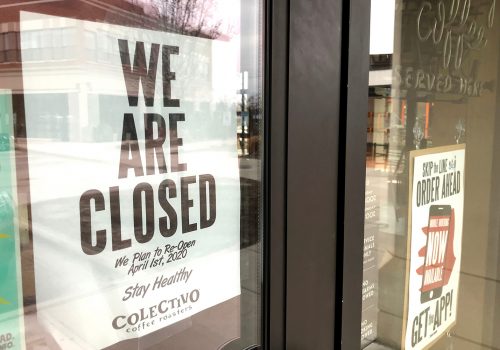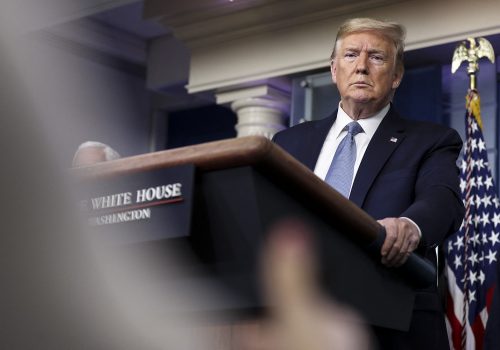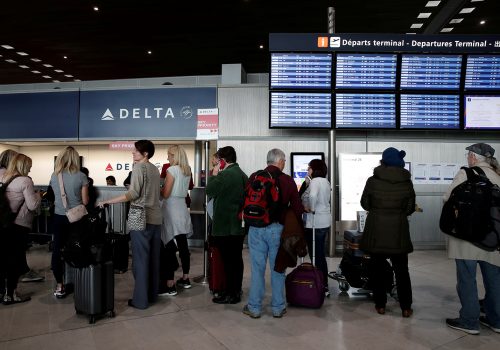CORONAVIRUS ALERT 3/18/2020
The Atlantic Council’s Coronavirus Alert is a regular summary of policy, economic, and business events around the emergency. To stay updated, sign up to the Coronavirus Alert here.
Summary:
The number of coronavirus worldwide topped 200,000, with authorities worldwide increasing economic stimulus measures in an attempt to mitigate the impact of the pandemic on individuals, companies, and markets. All fifty US states have now registered cases, as hospitals face shortages of medical equipment.
Statistics:
There are now in excess of 200,000 cases worldwide in nearly 160 countries and territories; more than 8,000 people have died.
QUOTE: “We have never in peacetime faced an economic fight like this,” said UK Chancellor of the Exchequer Rishi Sunak, Politico.eu reported.
HEALTH AND SCIENCE:
- Coronavirus cases have now been registered in all fifty US states and the District of Columbia, The Washington Post reported. More than 110 people have died from the virus, many of whom had underlying health conditions from diabetes to kidney failure and hypertension, the Post said.
- Hospitals across the United States dealing with coronavirus are running out of medical equipment, including masks and gowns, The Wall Street Journal said. The Pentagon said March 17 that it will provide up to 5 million respirator masks and other equipment to protect front-line responders, the Journal also reported.
- Nevada Governor Steve Sisolak announced the closure of casinos and other non-essential businesses in the state from noon on March 18, KTNV reported. Diners will not be allowed to eat inside restaurants, KTNV said.
- Tesla must suspend normal operations at its auto factory in Fremont, California to comply with measures that require millions of local residents to stay at home, The Verge reported, citing officials.
- Leaders from European Union nations agreed to shut down external borders immediately in a bid to prevent the spread of coronavirus, ITV News reported. The measure prevents foreigners from entering any of the twenty-seven nations for the next thirty days, ITV said.
- Italy may extend a national shutdown beyond April 3, Bloomberg reported, citing newspaper La Stampa. The country has the second-highest incidence of coronavirus, with more than 30,000 registered infections and in excess of 2,500 deaths, the news service said.
- Taiwan will bar entry except for foreign residents and diplomats as the island tries to stem an increase in coronavirus cases from people returning from other countries, especially Europe, Reuters reported. Everyone entering Taiwan will be put in home quarantine for fourteen days, Reuters said.
- Coronavirus cases have spiked in Asia, a second wave of infections following weeks of declines, the Financial Times said. In China, the number of so-called imported infections from overseas has increased to 155 from fewer than fifty, two weeks ago, the FT reported. The emergence of new clusters in South Korea, including nursing homes and churches in Daegu, the city in South Korea where isolation and mass testing checked the spread of infections, has rattled officials, the newspaper said.
- Iran recorded its largest number of deaths in one day from coronavirus as the death toll surpassed 1,000, The Washington Post reported. Some 147 people died between March 17 and 18 bringing the total to 1,135, the Post reported, citing the country’s deputy health minister.
- Australia banned “non-essential” gatherings of more than 100 people and discouraged overseas travel, the BBC reported, citing Prime Minister Scott Morrison. Schools, public transport, and public squares will remain open, the BBC said.
- A report by Imperial College London that informed a toughened UK approach on coronavirus also influenced the White House to step up measures to isolate members of the public, The New York Times reported. The research, led by a prominent epidemiologist, Neil Ferguson, projected up to 2.2 million deaths in the United States under a worst-case scenario, the newspaper said. “A lot of it is not what they say, but who says it,” said Devi Sridhar, director of the global health governance program at Edinburgh University, the New York Times reported. “Neil Ferguson has a huge amount of influence.”
- Ferguson is now self-isolating after developing a fever and a persistent cough, Reuters reported. Meanwhile UK nationals have been advised to avoid all non-essential foreign travel because of coronavirus, initially for thirty days, the BBC said, citing the Foreign and Commonwealth office. All Church of England services have also been suspended, the BBC reported.
- A sudden explosion in demand for online health consultations has overwhelmed telehealth services, news service Stat reported. Hospitals have scrambled to transfer routine care online in the response the coronavirus outbreak, Stat said.
QUOTE: “At a time when everyone needs better information, from disease modelers and governments to people quarantined or just social distancing, we lack reliable evidence on how many people have been infected,” John P.A. Ioannidis writes in news service Stat. “[T]he consequences of long-term lockdowns are entirely unknown.”
FINANCE AND ECONOMICS:
- Government bonds as well as stock markets fell, a sign that even assets typically regarded as havens are coming under pressure because of the coronavirus pandemic, the Financial Times reported. Traders said fund managers have been forced to dump their most liquid assets in order to return cash to investors, the FT said. “Bond, currency, and commodity markets around the world are in turmoil amid investors’ anxiety about the coronavirus pandemic,” The Wall Street Journal reported.
- The Trump administration is considering a stimulus package of as much as $1.2 trillion, including direct payments of $1,000 or more to Americans within a fortnight, Bloomberg reported. “Americans need cash now, and the president wants to give cash now. And I mean now, in the next two weeks,” Treasury Secretary Steven Mnuchin said at a White House briefing yesterday alongside President Donald J. Trump, the news service reported.
- The US Federal Reserve on March 18 said it plans to restart a crisis-era facility that gives twenty-four big financial institutions known as primary dealers access to short-term loans, The Wall Street Journal reported. The Primary Dealer Credit Facility was established in 2008, the Journal said. Earlier in the day the central bank said it will make loans to US corporations to help calm short-term debt markets, the newspaper also reported. The Fed is focusing on the $1.1 trillion market for short-term corporate IOUs called commercial paper, which companies use to finance their day-to-day expenses including payroll, the Journal said.
- The UK announced 330 billion pounds in loan guarantees and 20 billion pounds in tax cuts, grants, and other assistance to businesses affected by the coronavirus crisis, Reuters said. “This is not a time for ideology and orthodoxy,” Chancellor of the Exchequer Rishi Sunak said, standing beside Prime Minister Boris Johnson, the newswire reported. Seventy one people have now died from the virus in the UK, Reuters said.
- Canada plans to announce an economic package of more than $25 billion to help businesses and individuals cope with the coronavirus pandemic, CBC News-Radio Canada reported.
- “If the experience in China is any guide, the United States should brace for a historic slump in retail sales, industrial output, and fixed-asset investments,” writes The Atlantic Council’s Bart Oosterveld. “Small and medium sized enterprises will bear a meaningful burden in this downcycle.”
QUOTE: “Our economy runs on a river of debt, and the debt clock keeps ticking when the economy shuts down,” H. Cochrane, a senior fellow at the Hoover Institution and an adjunct scholar at the Cato Institute, writes in The Wall Street Journal. “What we do now sets the precedent for what we will do in deadlier pandemics to come.”
BUSINESS AND TRAVEL:
- Massive traffic lines snarled borders throughout Europe following a travel ban, the Associated Press reported. Trucks were backed up for seventeen miles on the Austrian side of the border with Hungary, AP said.
- The French Open tennis tournament has been postponed until September because of coronavirus, Forbes reported. Roland Garros, as it’s also known, was scheduled to run from May 24 to June 7, and will now take place from September 20 to October 4, Forbes said. That prompted the US Open to say that it may also postpone to a later date, the magazine reported.
- The Euro 2020 tournament, “second only to the World Cup in importance and value in international soccer,” has been put back by a year, The New York Times said. Copa América, South America’s continental championship, scheduled to run at the same time as the Euros, said hours later they will do the same, the newspaper reported.
- Glastonbury, the world’s biggest outdoor music festival, has been canceled due to the coronavirus outbreak, Reuters reported. Taylor Swift and Paul McCartney were among those scheduled to play at the UK festival’s 50th anniversary in June, Reuters said.
- “What Virus? The IOC Says the Summer Olympics Will Go On” runs a New York Times headline. Thomas Bach, the president of the International Olympic Committee, said in a statement that the IOC remains focused on holding the Games in Tokyo in July, the newspaper reported. Athletes and others were stunned as they were expecting a postponement, the New York Times said.
- Norway has barred its residents from self-isolating at their holiday homes to avoid rural hospitals being overrun with coronavirus patients, CityLab reported. Those who don’t comply face a fine of almost $2,000 or fifteen days in prison, CityLab said.
- BMW shuttered car plants in Europe as the coronavirus outbreak prompted the worst year-to-date start for car sales in seven years, Bloomberg reported. Other automakers including Volkswagen have also reduced production, Bloomberg said.
QUOTE: “We’re going to have a recession, and in a certain sense we want a recession; if the economy is growing, it means too many people are still moving around,” columnist Megan McArdle writes in The Washington Post.
RESOURCES
- Johns Hopkins University interactive web-based dashboard to visualize and track reported cases in real-time.
- CDC provides frequent updates and background information on Coronavirus.
- The World Health Organization daily situation reports.
- Harvard Business Review guidance on managing the emergency for corporate decisionmakers.
- The Society for Human Resource Management resources on managing communicable diseases.
- The Wall Street Journal has a useful guide to travel and travel insurance.
- State Department Travel Advisory for China.



